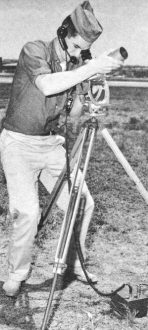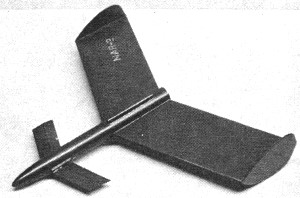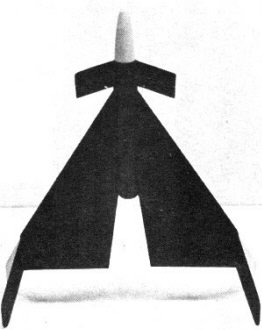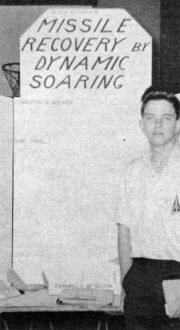|
In
the same manner that radio control model aircraft are today under scrutiny by government
regulating agencies (DHS, FBI, et al), model rocketry suffered various forms of
discrimination in its early days of widespread popularity. Per this 1963 article
from American Modeler magazine, "The status of model rocketry under the law has
often been a questionable one in several sections of the country. Our hobby has
been variously labeled as fireworks, handling and discharging explosives, public
nuisance (which covers a multitude of sins), disturbance of the peace, a hazard
to aircraft in flight, dangerous to persons and property on the ground, and 'dangerous
killer.' As the record shows it is none of these." The more things change, the more
they stay the same; ignorance is NOT bliss.
Rocket Trails
by Harry (Old Rocketeer) Stine

Dennis Guill, 16, New Canaan, Connecticut, follows model aloft
with tracking telescope at L.G. Hanscom Field, Mass., during NAR meet. (USAF photo)
The status of model rocketry under the law has often been a questionable one
in several sections of the country. Our hobby has been variously labeled as fireworks,
handling and discharging explosives, public nuisance (which covers a multitude of
sins), disturbance of the peace, a hazard to aircraft in flight, dangerous to persons
and property on the ground, and "dangerous killer." As the record shows it is none
of these.
State and local laws treat model rocketry differently from state to state and
even from town to town. The way that civic officials and John Law look upon model
rocketry can be generally classified as follows:
1. Look the other way. Certain places may have laws about fireworks, explosives,
public nuisance, etc. Officials there know that some model rocketry is going on
and that our little birds are streaking up into the blue. But said officials have
other things on their minds like juvenile thugs, murderers, public and/or private
scandals and similar items to keep them plenty busy. They are therefore much too
occupied to bother the model rocketeers - unless some joker in town blows his silly
head off with a home-made bomb. Or until some do-gooder complains about "those wild
young men flying dangerous things out in that field a mile from our house." Even
though there is no law that sez specifically "no model rockets," the officials can
always dig something out of the statute books and use it to bring model rocketry
to a halt.
2. We just heard about it. In this situation, model rocket engines have
been sold in local stores for years. People have been happily buying Jetex engines
for model airplanes, plus pre-packaged powerplants for their modrocs, and they have
been safely flying same all over the place. Then some official happens to see this
going on. He remembers that there is a law somewhere that says you can't do it.
So he stops you and slaps a general ban on the hobby.

Canard B/G design by Old Rocketeer features low wing loading
and moderate wing sweep. Uses engine casing jerk system to actuate canard surfaces.

Paul Hans' canard B/G was single-staged and prototype of Centuri
"Acro-Bat." Latest versions of this ship are two-staged.
3. The Flat No. Such places have laws on the books that say in no uncertain
words, "no model rockets because they are dangerous."
4. Yes, providing ... In this place, you can fly model rockets or otherwise
engage in the hobby providing you have a permit to do so. Said permit costs you
so many dollars per year. It can be revoked at any time for any cause. It gives
you permission to do something, but does not mean that the town or state provides
you with safety inspection, flying areas, or anything else. It is a matter of control,
they say, so that they will know who is flying or possessing model rockets and so
that they will have the ability to yank the permission if something goes wrong.
5. So What? In this lovely place, there are no laws agin' model rocketry,
the officials couldn't care less, and people buy and fly to their hearts' content.
6. Yes, You May. This is very rare. Said place has on its statute books
a law saying that model rocketry is definitely permitted and encouraged providing
that certain reasonable safety rules are followed.
In the United States, model rocketeers run up against all of these, a combination
of them, or variations on the theme. Often, when you go into the local city hall
to ask if you can fly, the official you ask will say NO simply because he doesn't
know what you are talking about, and therefore saying NO gets him off the hook;
he avoids responsibility by negative action.
In the past year, there has been a great deal of activity on the legal side of
model rocketry. I want to report some of these things to give an indication of what
we may expect from time to time not only from civic officials but also from legislative
bodies.
In 1962, General Counsel Richard Shaffer of the NAR drew up the basis for a permissive,
educational state statute on model rocketry which could be used by NAR members and
model rocketeers in various states who wished to take some sort of action through
the state representatives to get a good law on the books where needed. Dick called
upon the extensive technical known-how available in the NAR and came up with what
the NAR calls "The Uniform Code of Model Rocketry." This document was designed to
served as a guide for NAR Senior Members and other adult citizens in working with
their state governments. It was not made available generally to youngsters, who
are not taxpayers or voting citizens and therefore do not have much voice in political
affairs because of the simple fact that nobody listens to them. Perhaps sad, but
very true. And when dealing with such things as these, you have to be quite realistic.

Gordon Mandell, NAR#1441, one of the winners of the North Nassau
Zone Science Congress (New York) and participant in the New York. Exposition of
Technology '63. Gordon, still in high school, has become one of the nation's experts
in the theory and design of B/G.
Meanwhile, the roof caved in in California. The State Fire Marshal's office took
a look at the California Fireworks Law which defines a "dangerous firework" as any
rocket or any object which "ascends into the air with a discharge of matter." Although
they did not stop jet aircraft from taking off at Los Angeles International Airport
and did not lift a finger to do anything about Jetex engines, they immediately stopped
shipment of all model rocket engines into California, confiscated any model rocket
engine they could get their hands on, and called upon the FBI to help them stop
shipments. When California model rocketeers went into orbit about this, the Fire
Marshal's office stated that they were not at all against model rocketry, and that
there were perfectly reasonable rules which existed to permit the hobby.
Notwithstanding the fact that something more than $1,500 per year in licenses
was to be required from each model rocket manufacturer who wanted to ship his products
into the state, any individual who wanted to fly a model rocket was reportedly required
to fulfill the following conditions:
1. Obtain a Pyrotechnic Operator's License, Second Class.
Cost: $5.
2. Post bond or insurance for $25,000.
3. Obtain a Permit for Public Display of Fireworks costing
$5 for each rocket.
4. Have an approved launching ground with a concrete
bunker or revetment at least 50 yards from the launcher.
When an adult with over a year's' experience in model rocketry applied for an
operator's license, it is reported that he was told that he did not have the requisite
experience. When he asked where he could get it, he was sent to a local amateur
rocket club. Said amateur rocket club told him that they were not flying at all
because they had not been able to obtain insurance that satisfied the requirements.
So our harried adult checked and found that his personal liability insurance policy
was more than adequate. I understand that he went into a local hobby store, bought
a Jetex engine with fuel, and then went out and watched a group of model aviators
fly with Jetex.
At this writing, the model rockets are grounded in California, the state where
Douglas, Lockheed, North American, General Dynamics/Astronautics, and Aerojet are
making and testing nearly all the rockets made in the USA for the armed services
and NASA. Model rocketeers are unhappy. So are science teachers. And so are a group
of adults led by Larry Holliday in Whittier, who are trying to get the whole schmear
straightened out. In the meantime, the situation isn't helping things a bit ...
a kid got killed in Los Angeles trying to make his own engines ... maybe because
he couldn't buy the mild pre-packaged ones we use and advocate.
Posted August 19, 2022
(updated from original post
on 6/24/2013)
|